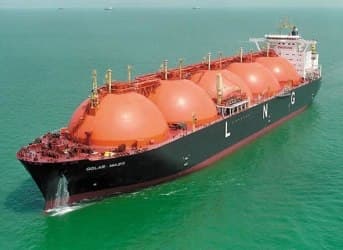On 18 November, following a meeting in Bangkok during his first foreign trip after winning reelection, President Obama said, after lauding the 2013 celebration of the 180th anniversary of Thai-U.S. diplomatic relations, “…we're taking new steps to expand trade and investment. The United States is already one of Thailand's biggest trading partners, and we're already one of the biggest investors in Thailand. But we believe we can do even more, so we've agreed to reconvene our trade and investment council to explore new ways that our companies and our entrepreneurs can do business together.”
Thai Prime Minister Yingluck Shinawatra, the country’s first female Prime Minister, during her opening remarks said simply, “We will also strengthen our cooperation in energy and food securities.”
Now the parameters of that brief observation are becoming clear – Thailand is interested in importing U.S. liquefied natural gas. During a seminar entitled "Thailand's Economic Outlook" held in Bangkok on 30 November in the wake of the Obama-Shinawatra meeting, Strategic Committee for Reconstruction and Future Development chairman Virabongsa Ramangkura told his audience that during Obama’s visit, Prime Minister Shinawatra urged the U.S. government to assist in supplying LNG to Thailand, seeking a commitment of 2.5 million tons a year of LNG over the next two decades. Virabongsa, who is also chairman of the Bank of Thailand's executive board, added that since 2007 the U.S. has increased its natural gas capacity by 500,000 tons annually, with plans to boost production by exploring further offshore maritime resources, noting, "The U.S. is starting to become a large exporter for energy products now."
A little history here. In the 19th century, Thailand’s astute foreign policy sustained its independence even as Britain, Holland, France, Germany, Spain and Portugal colonized its neighbors.
Related Article: The Smart Way to Play the Natural Gas Boom
Fast forward a century, and Thailand discreetly supported the U.S. military effort in Vietnam, allowing the U.S. military to operate air bases in the north of the country.
So, reaching out to the U.S. is hardly new.
And Thailand certainly needs the imports.
Thailand's state owned PTT Plc, the nation’s largest energy conglomerate, expects LNG imports to more than treble over the next few years as domestic demand increases. PTT Plc senior executive vice-president Charcrie Buranakanonda told reporters that in 2013 Thailand’s LNG imports will exceed 2.4 million tons, soaring to 3.5 million tons in 2014, up from an estimated 2012 level of 1 million tons, even as Thailand’s natural gas production is predicted to begin declining in 2017.
Even worse, according to PTT Plc, Thailand's natgas demand is expected to rise to 6 billion cfpd in 2021, which would far exceed both indigenous production and that from the Malaysia-Thailand Joint Development Area.
Hence, the outreach to the U.S.
But, back home?
Shinawatra is less popular than in Washington, with the political opposition holding her feet to the fire for failing to deal with the country’s endemic corruption.
Related Article: Former Enemies Japan and Russia to Trade LNG?
On 28 November Shinawatra, whose brother is ousted former Prime Minister Thaksin Shinawatra and fled the country after facing a two-year jail sentence on corruption-related charges that he claims were politically motivated, surmounted a Parliamentary no-confidence vote initiated by her opponents. Yingluck won 308 of the 467 votes, securing support even from outside her six-party coalition, but the vote represents some potentially ominous graffiti on the wall for her government if it continues to fail to reduce corruption.
The Thai Prime Minister has a lot on her plate. Since her election in August 2011, Yingluck has survived parliamentary unrest, an economic downturn and massive flooding throughout the country. The upside is that the Thai royal army has remained in its barracks despite fears of yet another coup and the country’s revered 84 year-old King Bhumibol Adulyadej has recovered from serious health problems, postponing what could become a constitutional crisis over royal succession.
So, will the U.S. gain a lucrative toehold in Southeast Asia’s booming energy import market?
Will Shinawatra’s efforts to burnish her image prove successful?
Given the country’s adroit diplomacy for more than a century, the odds seem better than for many of its neighbors, most notably Burma. Covering their bets, after the second meeting of the Bahrain-Thai High Joint Commission, the two nations on 1 December signed agreements to work more closely on food and energy security issues.
By. John C.K. Daly of Oilprice.com


















